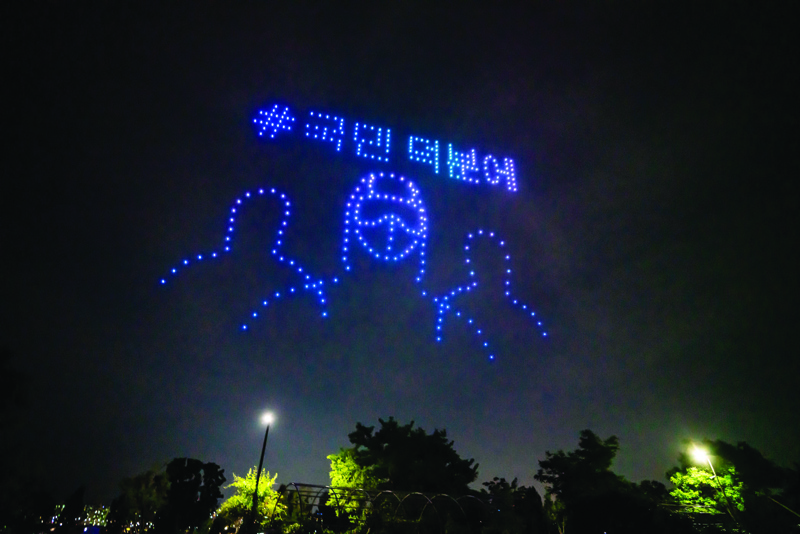
NEW DELHI: India yesterday became the third-highest coronavirus caseload in the world, as officials warned hospitals in the United States were in danger of being overwhelmed by a surge in infections. Despite signs of progress in parts of Europe - where the Louvre in Paris reopened yesterday - total global infections are fast approaching 11.5 million, with more than 533,000 deaths.
The Indian government - like many around the world - has gradually lifted virus restrictions to help the battered economy, but the number of cases has continued to climb, with 24,000 reported in 24 hours to take the total to nearly 700,000 yesterday. India's major cities including New Delhi and Mumbai are the hardest-hit, and critics say too few tests are being conducted and that many COVID-19 infections are likely to go undiagnosed.
The surge has forced authorities in India to convert hotels, wedding halls, a spiritual center and even railway coaches to help provide care to coronavirus patients. The Kerala state capital, Thiruvananthapuram imposed a new lockdown from yesterday with public transport shut and only pharmacies allowed to open. The clampdown came after hundreds of new cases were reported across the state, which had been praised for its action to curtail the pandemic.
And in Australia, where the virus outbreak had largely been brought under control, a new spike in cases in Melbourne forced authorities to effectively seal off the state of Victoria from the rest of the country. There was an illustration of the lingering threat of the virus in Fiji, with the Pacific nation confirming yesterday its 78-day run without any cases had ended with a 66-year-old man testing positive.
The US - the worst-hit nation - has struggled to respond to the devastation wrought by the virus, with its national death toll rising to nearly 130,000 out of 2.8 million confirmed cases, and many states hit by increasing infections after lockdowns were eased. Hospital beds are full in parts of Texas, while calls for fresh stay-at-home orders are growing. Some mayors have said their cities reopened too early, as President Donald Trump tried to downplay the disease that has gripped much of the country.
The annual July 4 holiday weekend was overshadowed by growing evidence that the fractured pandemic response has exacted a heavy price across the south and west of the country, after previous hotspots such as New York emerged from the worst of the virus. "Our hospitals here in Harris County, Houston, and 33 other cities… they're into surge capacities. So their operational beds are taken up," said Lina Hidalgo, chief executive of Texas's Harris County, which includes Houston.
Steve Adler, the mayor of Austin, Texas, also expressed concern that the healthcare system could buckle as the disease spreads rapidly. "If we don't change the trajectory, then I am within two weeks of having our hospitals overrun. And in our ICUs, I could be 10 days away from that," he told CNN. The US is now recording 40,000 new cases a day, with a peak of 57,000 on Friday alone.
In South Africa, dozens of military medics were deployed on Sunday after a surge in infections in East Cape province. Like India, South Africa imposed some of the strictest stay-at-home measures in the world in late March in a bid to limit the spread of COVID-19, but the number of infections is rising daily as lockdown rules are gradually eased.
Iran announced 163 new deaths, the country's highest official one-day toll since the outbreak began, while Morocco discovered an outbreak in a fish-canning factory, with 300,000 inhabitants placed under lockdown. Latin America's grim virus battle continued, with Chile passing 10,000 deaths on Sunday, while Mexico has had 30,000 fatalities.
Meanwhile, hundreds of drones lit up the night sky in Seoul for a spectacular showcase of motivational and awareness messages as the world battles the coronavirus pandemic. Three hundred unmanned aerial vehicles were programmed to form images above the Han river - which runs through the South Korean capital - for the eye-catching flash mob.
The show began with messages reminding people of key precautionary measures, including wearing masks, washing hands and keeping a two-meter distance from others. The drones created images of a mask surrounded by coronavirus particles, quickly shuffling to form two hands and water droplets against the dark night sky.
The 10-minute show shifted to messages of gratitude for medical personnel in the frontlines of the pandemic as well as all South Koreans for their collective efforts. "THANKS TO YOU," the drones wrote in the sky next to a heart shape, then formed a silhouette of the Korean peninsula with the message: "Cheer up, Republic of Korea." The government-organized event on Saturday night was not advertised in advance in consideration of social distancing rules, the transport ministry said. - Agencies
.jpg)



